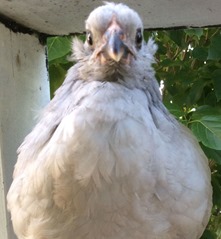 The Six Chix Project is all about increasing the resilience of food production to Tuvalu by introducing better breeds of laying chickens for families to keep in their back yards.
The Six Chix Project is all about increasing the resilience of food production to Tuvalu by introducing better breeds of laying chickens for families to keep in their back yards.
Of the 20 billion domestic chickens living on earth (with as much as 50 billion raised each year), not many of them found their way to Tuvalu. The local chicken here is small (bantam sized) and produces between 50-100 eggs per year. People loosely keep them around the house, but they are free to roam, not fed consistently, not housed and have to fend for themselves against equally unfed dogs, cats, rats and very wet weather, including cyclones ! People generally don’t collect the few eggs they produce as these are hidden in bushes and they only know about them when another clutch hatches out. They also spend a very large part of their time ‘clucky’ or ‘broody’ (the tendency to sit on eggs). Occasionally the chickens are caught and eaten.
Tuvalu chickens are truly mutts – a curious mixture of breeds not really good for eggs, and not really good for meat. As a food source they are largely ignored. If they ever came from any improved breeds of chickens, those traits have long been lost through generations of uncontrolled breeding. This is not all bad since they are hardy creatures, able to live in the tough conditions on an atoll and can occasionally supplement the local diet of fish, pork, imported chicken and preserved meats.
With non-communicable diseases at an all-time high, people living here need better access to locally-produced sources of protein. The eggs available in the country are imported from factory farms in Fiji and are often way past their use-by date. We used to throw half of the eggs we bought away because they were green inside !
Past attempts to establish commercial farms for chicken meat and eggs in Tuvalu failed miserably. I can think of at least 3 projects, one for eggs and a couple for meat birds. The main problem was the supply of feed which has to be imported from Fiji and is completely unreliable. The costs involved with imported feeds are also high because they must include freight.
Our mission is to introduce improved breeds of chickens for backyard farming in Tuvalu. We have already imported some chickens and have started working out some of the unique problems people might face growing chickens on a Pacific atoll. The problems include sourcing high-protein feed, finding cheap and locally accessible ways to care for them (worming and dealing with other problems) and changing the way people keep chickens so they can get the best out of them. Using productive dual-purpose breeds, we believe we can encourage families to keep just 6 chickens in their back yards, be able to feed them and reap the rewards in eggs and meat. In these pages we will show what works and what does not, provide plans and recipes for success and support the many local families that have already put up their hand to receive chicks from our small demonstration farm.
